The Basque Conflict and Ireland
Published in 18th–19th - Century History, 20th-century / Contemporary History, Features, Issue 3 (Autumn 2001), Volume 9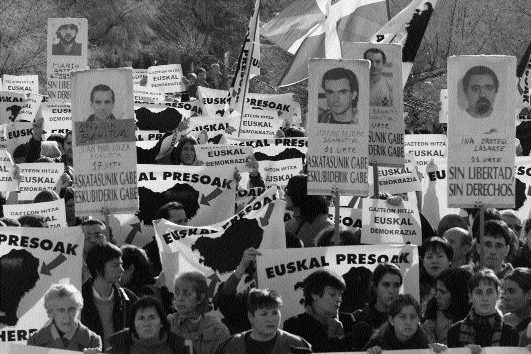
‘Basque prisoners to the Basque Country’-relatives and supporters of ETA prisoners demonstrate in Vitoria, 3 December 1999. (AP/Jon Dimis)
The ground shifts constantly: comparisons and contrasts between the conflicts in Northern Ireland and the Basque Country always run the risk of burial in the next seismic shift in events. Many Spanish observers are hostile even to attempting such an exercise.
We do not see the least connection between the two conflicts. To attempt to compare both situations is like comparing the Lapps with the Zulu tribes of South Africa.
(Security and defence journalist, Julio Trujillo, Polica Exterior, 1997).
This position has become the orthodoxy in Madrid, shared by both the centre-right Partido Popular (PP) government and the centre-left Socialist Party (PSOE) opposition, and by most commentators.
A complicating factor is the extent to which Spanish rejection of Basque/Irish similarities is based on a reading of the Irish conflict imbued, perhaps unconsciously, with romantic Catholic (inter)nationalism. It is not unusual to hear members of the Madrid establishment speak of the IRA as an army of liberation, fighting an anti-colonial war against Protestant settlers and Spain’s old enemy, perfidious Albion. While IRA atrocities are abhorred, Gerry Adams is regarded as a statesman, pursuing the self-evidently legitimate aim of re-uniting the natural island unit of the Irish nation. The Basque ETA (Euskadi ta Azkatasuna, ‘Freedom for the Basque Country’), in contrast, is stereotyped not only as terrorist but as an organisation dominated by mafiosi and psychopaths, conducting a self-evidently illegitimate campaign against the natural unity of the democratic Spanish nation-state.
The assertion that the Basque and Irish troubles have nothing in common is a political response to the opposite proposition: that the two conflicts are very similar indeed, and that the 1998 Belfast Agreement is a model which can be tranferred almost unamended to Bilbao. This is the stance of Basque nationalists, both moderate and radical. The meetings which led to ETA’s 1998 ceasefire, and the establishment of a broad front for Basque sovereignty, were known as the ‘Irish Forum’. Basque nationalists, not unnaturally, have attempted to instrumentalise the Irish peace process, which had a very positive international image, for their own purposes. They inevitably highlight those aspects which suit their interests, and disregard elements which do not fit into their political programmes.
Historical background
The Basques have occupied an inverted triangle on either side of the north-west third of the Pyrenees for at least 2,000 years. They may be a remnant of a great migration from the Caucasus to North Africa. They have certainly spent more time in the same place than most European peoples. The traditional school of Basque nationalism insists that Basques have lived where they live today from, quite literally, time immemorial. As is so often the case with nationalist ideology, the conviction with which this widespread belief is held is more significant than the scant evidence which supports it.
In historical times, the land occupied by Basques has extended roughly 160 kilometres from Bilbao to Bayonne along the coast. Inland, the southern limits run along the Ebro River to Tudela on the Spanish side, up to the Pic d’Anie on the Pyrenees, and then across to Mauleon in France, a total area of a little more than 20,000 square kilometres with a population today of just under three million, one-tenth of which is on the French side of the border. The three historic Basque provinces in France today are Soule, Labourd and Basse Navarre; on the Spanish side are Vizcaya, Álava, Guipúzcoa and Navarre.
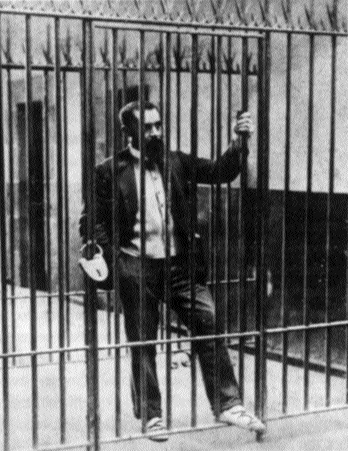
Sabino Arana-founder of the Basque Nationalist Party in 1895. (Sabino Arana Foundation, Bilbao)
The Basque language, Euskera, spoken by some 25 per cent of the population, is probably the oldest and certainly most enigmatic language on the continent. It cannot even be classified as Indo-European. Ez means No and Bai means Yes, and double consonants like tz, tx and ts seem to crop up twice in every sentence, and sometimes twice in the same word. Other cultural traits unique to the Basques include sports as distinctive as competitive rock-lifting and pelota (jai-alai), and a living tradition of orally composed poetry.
Modern Basque nationalism developed at the end of the last century. Rapid urban industrialisation, based on steel and ship-building, seemed to threaten the rural-based economic and cultural value system to which many Basques were deeply attached. They felt particularly threatened by an influx of impoverished Spanish-speaking labourers, largely from Andalusia and Galicia, whose anarcho-socialist politics and allegedly loose sexual morals were anathema to many deeply Catholic Basques. Critics of nationalism, from both the Left and Right, point out how artificial some aspects of this nationalism were. The founding father of Basque nationalism (and of the Basque Nationalist Party [PNV]), Sabino Arana, had to invent not only a flag but also a name, Euskadi, for the country he wished to free from Spanish ‘domination’. This, however, is really only to say that nations are constructed by their constituent peoples, and are not ahistorical absolutes handed down by God. Most nations look more than a little ridiculous in the first phase of construction, when the raw mortar of rhetoric and myth is most apparent.
For hundreds of years, like all the regions which today make up the Spanish state, the Basque provinces had shifting relationships with the centralising kingdoms of Castille and Aragon. Like most regions, the Basque provinces enjoyed special charters (fueros), ceding substantial economic or social rights. Catalonia lost these rights in the early eighteenth century, while the Basques retained most of them until 1876. By then many urban Basques saw the charters as an anacronistic barrier to free trade, but in the countryside they were still jealously guarded. Rural Basques took the losing side of the traditionalist Carlists in Spain’s two great nineteenth-century civil wars, while the cities largely sided with the progressive liberals.
A latent but potent seed of modern Basque nationalism was fertilised by the defeat of the Carlists. Though the latter were fighting for a Madrid-based monarchy, nationalists have come to see them as prototypes of this century’s struggle for independence, because they defended the ancient rights of the Basques. The significance of this view lies not in its flimsy historical basis, but in the fact that so many Basques believe it today.
Spanish Civil War
The Spanish Civil War (1936-39), sparked off by General Franco’s rebellion against the democratically-elected Republican government, marked a turning point in Basque nationalism. Eschewing its traditionalist and clericalist past, the Basque Nationalist Party threw in its lot with the Republic, in exchange for an autonomous government.
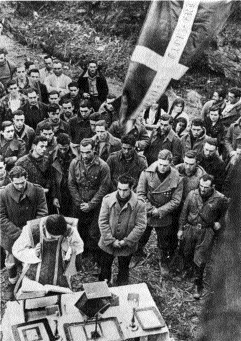
Basque soldiers celebrate Mass before battle, 1937. (David Seymour, Magnum Photos, Inc.)
This first Basque nationalist administration lasted just nine months. Franco’s 1937 offensive, spear-headed by the notorious and subsequently deeply symbolic bombing of Guernica by his Nazi allies, crushed the defending Basque nationalist and socialist forces. Thereafter Franco’s regime imposed harsh and unprecedented measures against all public manifestations of Basque cultural and political identity. Parents were even forbidden to christen their children with first names in Euskera. ‘If Sabino Arana considered Euskadi to be an occupied country, Francoism made that occupation real and effective’, wrote Jose Maria Garmendia in his history of ETA.
For the next two decades, the PNV generation which had lost the war offered largely impotent opposition to the dictatorship. By the 1950s, some of their less patient offspring began to consider other means of struggle. ETA was born from a student study group in 1959. While ETA was commited to armed resistance from the start, it did not carry out its first killings until 1968. In the meantime, it passed through an ideological ferment, moving rapidly from Catholic social radicalism through a spectrum of anti-colonialist positions, ultimately defining itself as a Marxist-Leninist movement commited to Basque independence and socialism.
More crucial than its theoretical debates, however, was its commitment to a particular model of practice, which remains dominant today, the ‘spiral of action-repression-action’: ETA carries out a provocative violent action against the political system; the system responds with repression against the masses; the masses respond with a mixture of panic and rebellion, whereupon ETA embarks on a further action which brings the masses a step further along the road to revolution. This grim motor shifted into gear when ETA carried out its first attacks, and Franco’s regime obliged with brutal and often indiscrimate repression against the wider Basque population. Its momentum has proved very difficult to halt ever since.
Transition to democracy
ETA’s most spectacular action under Franco was the assassination, in central Madrid in 1973, of the dictator’s prime minister, Luis Carrero Blanco. Many Spanish democrats privately applauded the attack, but the main opposition parties, who espoused a national reconciliation strategy that made the subsequent relatively peaceful transition to democracy possible, publicly condemned ETA’s use of violence as morally unacceptable and politically counter-productive.
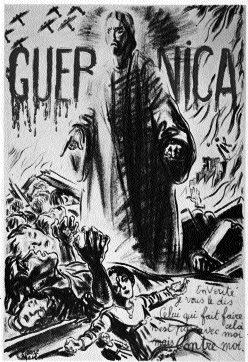
GUERNICA-‘He who has done this is not with me but against me’-an angry Christ refutes Nationalists’ claim to be defending Christianity in a French anti-fascist poster.
After Franco’s death in 1975, his successor, King Juan Carlos, surprised almost everyone by facilitating this transition. By 1978, Spain had a democratic constitution which guaranteed full civil and political liberties, as well as provision for extensive devolution to minority nationalities like the Basques.
The degree of devolution was not sufficient, however, to satisfy the PNV, which had re-emerged as the largest political grouping in the Basque Country. It was the only major democratic party to call for abstention in the constitutional referendum. Crucially, the Basque Country was the only region in Spain where the constitution was not supported by a majority of the electorate. Nevertheless, within a year the PNV accepted the autonomy set out in the new constitution. The PNV has presided over every autonomous government in the Basque Country ever since, governments which probably enjoy more devolved power than any other regional administration in Europe.
In this context, one might have expected ETA to wither away, as an obsolete response to a political system which no longer existed. On the contrary, the more democratic Spain became, the more hardliners within the group accelerated its killing rate, claiming ninety-one victims in 1980, as against sixteen in 1975. Many of these attacks targeted senior army officers which strengthened the hand of elements in the military involved in plotting anti-democratic coups, culminating in Lieut-Col Antonio Tejeros abortive seizure of the Spanish parliament in 1981. From ETA’s perspective, a successful coup might not have been an unwelcome outcome; it would have unmasked the ‘fraudulent’ nature of Spanish democracy. That young democracy, however, proved surprisingly robust in the face of such appalling pressures, at least on the surface.
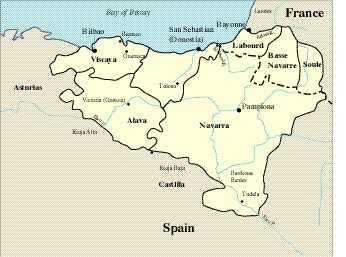
(Claudia Blí¤íŸ)
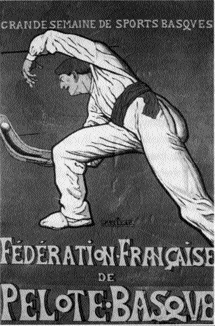
Pelota-a sport unique to Basques; 1930s poster. (Musée Basque, Bayonne)
The resounding absolute majority won by Felipe Gonzalez’s Socialist Party (PSOE) in October 1982 was another turning point in the Spain’s transition to democracy. This was the first post-Franco government whose members had no links with the dictatorship, and the first government of the Left (nominally, at any rate) since the Republic. Again, there were high hopes that ETA would give this new development the benefit of the doubt, and at least offer a short-term truce. Within days, such hopes were dashed as ETA killed another senior general in Madrid. With the exception of its recent ceasefire, and several other pauses in violence linked to abortive negotiations, ETA has continued its campaign throughout the final two decades of the last century, and into the first decade of this one. The group has never surpassed its 1980 tally of ninety-one killings, but its recourse to the car-bomb in the late 1980s greatly increased the number of civilian casualties. Throughout this whole period the PNV governed the Basque Country in coalition with the Socialists, and shared a common platform against ETA’s terrorism with Madrid-based democratic parties.
In the 1990s, following the arrest of ETA’s top leadership, the radical nationalists developed a new strategy and slogan: ‘Socialise the suffering’; in theory, all of society must share some of the pain suffered by its militants and prisoners. In practice, it meant attacks on an ever-widening circle of ‘legitimate targets’: hence the campaign in 2000 against local politicians, jurists, academics, business people, and journalists. It was also the trigger for the youth intifada known as the kale borroka (street struggle). It is this daily (and nightly) presence of gangs of hooded teenagers on the streets, more even than ETA’s more lethal but sporadic attacks, which has created an atmosphere of unprecedented polarisation in Basque society. It is also a fertile recruiting ground for ETA.
What made—and keeps—ETA so unwilling to come to peaceful terms with Spanish democracy? This is a complex question and is not adequately answered by stereotyping the group and its supporters as ‘fascists’, ‘mafiosi’ or ‘psychopaths’, as the Madrid media and political parties tend to do. One key to understanding ETA’s continued appeal lies in the almost Pavlovian response of the Spanish state to the group’s formula of ‘action-repression-action’. This was very obvious under the dictatorship when the ageing Franco often kept the entire Basque Country under a virtual state of siege for months on end after ETA attacks. The ferocious escalation of ETA’s campaign during the transition to democracy was also ‘rewarded’ with continued indiscriminate repression. Peaceful demonstrations were met with lethal gunfire, and police riots rampaged through entire towns. The radicals’ thesis that ‘nothing has changed since Franco’ became self-fulfilling for those who were already disposed to believe it.
GAL’s ‘dirty war’
A change in security strategy could have been expected from Felipe Gonzalez’s Socialists in 1982. But his government failed to remove police with notorious records for rights abuses from top positions. Worse, in response to ETA’s continuing provocations, the Socialist administration quickly became embroiled in a ‘dirty war’ which had disastrous repercussions, down to the present day. From 1983 to 1987, the GAL (Grupos Antiterroristas de Liberacin) killed twenty-seven people, and wounded as many more, mostly in ETA’s sanctuary in the French Basque Country. Some of the targets were senior members of ETA, but a third of the victims were ordinary French citizens.
The purpose of the GAL was not simply to decapitate ETA. Spanish military intelligence documents indicate that they were fully aware that this hydra could always grow more heads.
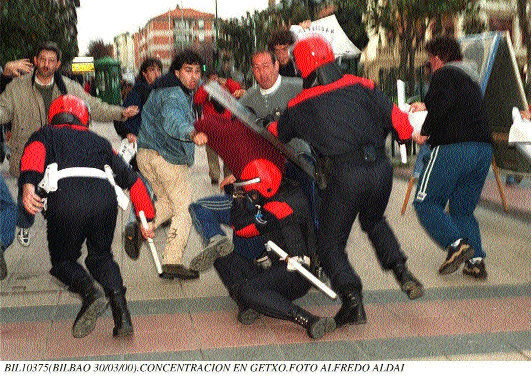
Basque youth engage in kale borroka (street struggle), Bilbao, 30 March 2000. (Alfredo Aldai)
The real point appears to have been to pressurise the French government and public opinion, which had been remarkably tolerant to the large community of ETA refugees on its territory, to drop its opposition to handing over suspected terrorists to Spain.
The dirty war inflicted a high cost on Spanish democracy. Judicial investigations into the GAL have finally established, with great difficulty, clear links between the Socialists, the security forces, and the death squads. In 1998, most of the 1980s anti-terrorist high command, including the then interior minister, were convicted of a GAL kidnapping. In 2000, a Guardia Civil general and a top Socialist official were jailed for the kidnapping and particularly gruesome murder of two young ETA members. ETA killed many more people than the GAL over the same period, and has continued to kill since the GAL were dissolved. But the impact of the dirty war on the first Basque generation to grow up under democracy was very damaging. It has provided just enough hard corroborative evidence, for those already inclined to accept it, that Spanish democracy meant continued lawless oppression for the Basque Country. A number of sober analysts believe that the GAL campaign guaranteed the generational reproduction of ETA into the new millennium.
Jose Maria Aznar’s centre-right Partido Popular government, which replaced the Socialists in 1996, insists that it rejects all extra-legal methods against terrorism. However, the reports of both Amnesty International and the Committee for the Prevention of Torture about continued human rights abuses of Basque suspects suggests that this is not the whole story, as do UNICEF’s concerns about the new provisions for jailing minors. A macro-trial of organisations and individuals allegedly linked to ETA also raises legitimate questions about human rights. Amnesty, while repeatedly calling on ETA to halt its campaign, has also strongly criticised the Spanish policy of dispersal of some 500 ETA prisoners and suspects to far corners of Spain, a measure which imposes considerable hardship on their families. Aside from its negative humanitarian aspect, this policy has undoubtedly mobilised many Basques, who often do not agree with ETA’s killings, against the state.
The ‘Irish Forum’
In 1998, it seemed that a new window of opportunity suddenly opened to end the conflict: a talks process, modelled explicitly on the Hume-Adams dialogue, had been established between the moderate nationalists, led by the PNV, and the political coalition which supported ETA, Herri Batasuna (HB). This ‘Irish Forum’ produced the Declaration of Lizarra in September, which appeared to commit the PNV to the active pursuit of Basque self-determination if violence ceased. In less than a week, ETA declared a unilateral ceasefire.
These developments received a less than rapturous welcome in Madrid. The Lizarra declaration was widely regarded as an act of treachery to Spanish democracy on the part of the PNV. From the perspective of Spanish constitutionalists, the moderate nationalists had irresponsibly abandoned twenty years of participation in institutions set up under the Statute of Autonomy. They had entered into a secret pact with a terrorist organisation without consulting the Spanish government. And they wanted to embark on a risky path to a vaguely defined Basque sovereignty which threatened to unstitch the whole fabric of statehood woven during the transition to democracy. The Basque nationalists countered, with a nod to John Hume, that they were taking a risk for peace. They also argued that they were not permanently bound by the terms of the autonomy statute, and were fully entitled to pursue a relationship with Spain more closely aligned to their own ideology.
If Aznar did not like the Lizarra declartion, he was scarcely more positive about the ceasefire. Though some—painfully slow—concessions were made on the prisoners issue, his interior minister, Jaime Mayor Oreja, took the view from the outset that the truce was a ‘trap’, during which ETA would reorganise and rearm. The government did agree to direct talks with ETA, but ruled out political concessions. The sole encounter which did take place was a dialogue of the deaf—the ETA representatives appeared even less inclined to engage in dialogue than the government spokesmen. The subsequent arrest of one of ETA’s negotiators by the French police did not help matters.
By the summer of 1999 it was clear that the truce was falling apart. But when ETA finally announced a return to violence in November, the group put most of the blame on the moderate nationalists, whom it accused of failing to pursue Basque sovereignty seriously. ETA’s renewed terrorism turned out to be at least as vicious, and perhaps more so, than earlier campaigns. Car bombs have been used repeatedly on busy streets, and journalists have joined local politicians on ETA’s ever-lengthening list of ‘legitimate targets’.
Meanwhile, the Madrid-based parties launched an unprecedented campaign against moderate Basque nationalism, because the PNV refused to drop its demand for sovereignty, though it had broken with HB over ETA’s return to violence. The PP campaigned, in May 2001’s Basque elections, to displace the PNV from the autonomous government, with qualified PSOE support. Had they succeeded, they might well have driven the moderates into the radical camp. In the event, the campaign boomeranged, and the PNV will again govern the region for the next four years. The electorate also punished HB severely for ETA’s new campaign, reducing its support from its ceasefire high of 17.6 per cent to a little more than 10 per cent. The organisation responded by choosing an even more radical leadership in June. With a new Basque government committed to Basque sovereignty by peaceful means, with Madrid’s continuing anathema against Basque nationalism, and with a still substantial portion of the population backing ETA’s terrorism, the Basque scenario looks even bleaker than the depressing prospect of collapsed institutions in Northern Ireland.
Comparisons & contrasts
The history of the Basque/Spanish conflict since the 1960s offers a number of similarities with the Irish/British conflict, but also significant differences. These are the only two conflicts in western Europe where an armed group has had the consistent support of a substantial sector of the electorate. All of the leftist terrorist groups (Red Army Fraction, Red Brigades, etc.) which emerged from May 1968 have long since vanished, largely because there was, to adapt Mao Zedong’s phrase, no sea of popular support in which they could swim. The IRA and ETA both draw on a deep reservoir of ethnic nationalism. In each case there is also a strong religious component, an ideology of blood sacrifice and martyrdom, which sustains their militants against the massive security resources of two large and prosperous states.
However, while the IRA at least appears to have learnt some negotiating skills over the last ten years, and seems to have become considerably more flexible in adapting its core principles to political realities, there is no sign of a corresponding shift in ETA. Its return to violence, at a point when it had succeeded in persuading moderate nationalism to adopt some of its key positions, shocked many of its own followers, though not enough of them to indicate that it is in terminal decline. Even those Basques most in favour of dialogue with ETA are beginning to wonder out loud whether the Marxist-Leninist component in its ideology—always much more dominant than the IRA’s vague socialism—may have created a self-sustaining revolutionary culture which cannot be grafted successfully onto a liberal democracy.
This problem is exacerbated by another point of difference with the IRA. Irish republican leaders have always shifted fluidly between military and political roles. ETA, in contrast, has tended towards a hermetically sealed miltary structure, which controls its political supporters at one remove. This has a number of negative implications. The military leaders are usually totally underground, often in another country, and thus impervious to feedback from their social base. Some observers, not all unsympathetic, suggest they are seriously out of touch with most recognisable forms of political reality. Meanwhile, the radical political leadership is in awe of the ETA commanders, and accepts their directives without much question, even when they disagree. And if negotiations are on the agenda, the government often does not know who to talk to on the military side, while the political leaders clearly lack the mantle of military authority so easily shouldered by some Sinn Féin figures.
It should also be noted that ETA does not draw its support mainly from economically marginalised sectors of the Basque community. The discrimination suffered by the Basques under Franco was cultural, not material, and the dispossessed in the Basque Country today are much more likely to be ethnically Spanish. A left-wing former leader of ETA scathingly refers to the current campaign as the ‘terrorism of well-being’.
There are also significant differences on the broader political front between the two conflicts. The key to the IRA’s engagement in the peace process was Peter Brooke’s 1990 statement, later enshrined in the 1993 Downing Street Declaration, that Britain had ‘no selfish strategic or economic interest in Northern Ireland’. One of Aznar’s senior advisors told me recently that it is ‘unimaginable’ that Madrid could make a similar statement. The Basque Country is not peripheral to Spain, it is considered central to the construction of the Spanish nation state. And if the Basque Country were to secede, might not Catalonia and Galicia follow? Would anything recognisable as Spain still remain?
Spanish nationalism is a force in this conflict. It is an ideology that rarely dares to speak its name, tainted as it is with Francoist associations. But for those who want to see Spain take a place at the top table in the European Union, the prospect of ceding internal sovereignty is a nightmare. Arguments in favour of a ‘Europe of the peoples’ cut little ice in Madrid.
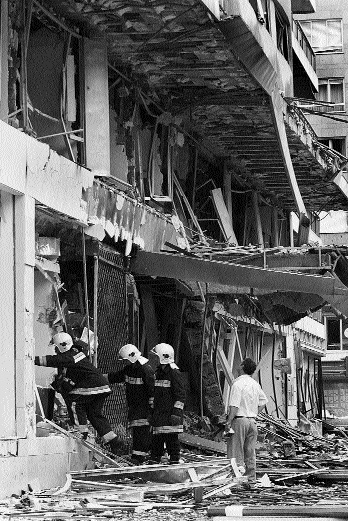
The aftermath of an ETA car bomb in Logroí±o, capital of Spain’s Rioja wine-producing region, 10 June 2001; fortunately, no-one was killed or seriously injured. (AP/Jon Dimis)
The Spanish centre-left has gone through an interesting transformation in this regard. In the late Franco period, self-determination for the minority nationalities was a prominent part of the PSOE’s programme. Once the party got its hands on the levers of power, this aspiration vanished. To advocate self-determination in PSOE circles today is to risk being accused of supporting terrorism.
On the international level, contrasts with the Irish situation are even stronger. The Basque diaspora has no equivalent of Washington to act as an honest broker. Nor is there any Basque equivalent of the Irish Republic to act as a democratic persuader. On the contrary, the French Basque Country is a complicating factor, since it falls under a second jurisdiction, but is claimed as an essential part of the Basque Country by nationalists. And less than 10 per cent of French Basques support that position, though their numbers are growing.
Perhaps the strongest contrast with Northern Ireland is potentially the happiest omen for the future of the Basque Country. Despite many tensions between ethnic Basques and Spanish immigrants, the conflict in Euskadi has never been a war between two communities, but between revolutionary nationalists and the Spanish security forces. There are disturbing indications that ETA’s most recent campaigns are indeed directed at creating lethal social antagonism between nationalist Basques and Basques who identify with Spain. But even here the fissures do not run along ethnic fault lines. Many ETA supporters today are drawn from immigrant stock, and many ethnic Basques are among ETA’s most articulate critics. Advocates of Basque sovereignty and of Spanish identity often belong to the same cultural and social organisations, frequently to the same families. The best hope for the Basques is that their very strong civil society traditions will be robust enough to hold them back from the real nightmare scenario: fullscale civil conflict.
Paddy Woodworth is a journalist with The Irish Times (woodworth@ireland.com).
Further reading:
P. Woodworth, Dirty War, Clean Hands: ETA, the GAL and Spanish Democracy (Cork 2001).
R. Collins, The Basques (Oxford 1990).
J. Sullivan, ETA and Basque Nationalism (London 1988).
P. Arthur, Special Relationships: Britain, Ireland and the Northern Ireland problem (Belfast 2001).
















